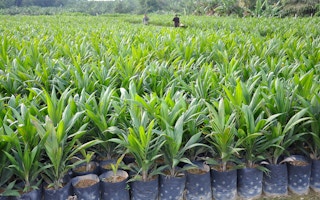The Roundtable for Sustainable Palm Oil (RSPO) on Wednesday ordered Singapore-based palm oil giant Golden Agri-Resources to prove that its operations on a controversial concession in Indonesia have adhered to their rules on environmental and socially responsible practices.
It also prohibited the company from acquiring or developing new land until RSPO is satisfied with the measures taken.
This move is the latest development in an ongoing investigation by the RSPO into Golden Agri and their subsidiary PT Kartika Prima Cipta (PT KPC).
The United Kingdom based non-profit Forest Peoples Programme (FPP) had filed an official complaint to RSPO against Golden-Agri last October, accusing the group of violating several RSPO rules.
The RSPO is an industry-led non-profit association which administers a certification process for sustainably grown palm oil, a crop which is in ever-increasing demand worldwide but has been linked to deforestation and the violation of forest people’s land rights.
Palm oil companies must follow a set of Principles and Criteria (P&C) set out by RSPO to get certified.
FPP versus Golden Agri
Among the rules that FPP said Golden Agri had violated were the need to ensure that indigenous communities living on company concessions give Free, Prior and Informed Consent (FPIC) for their land to be used for palm oil development, and requirements that a company should comply with all laws of the country it was operating in.
Golden Agri had also not carried out satisfactory or timely evaluations on whether the land owned by PT KPC had a high environmental, social and cultural conservation value (HCV), said FPP.
It added that Golden Agri had proceeded with new developments before proper HCV assessments had been done; this move violated community rights and left villagers feeling inadequately compensated for their land.
Golden Agri had in March issued a detailed response to an inquiry by RSPO with a statement that while the company acknowledged “some shortcomings” in PT KPC’s operations in Kalimantan, Indonesia, it had not broken any laws related to land ownership and business development permits, or in relation to acquiring land from communities.
The company had also confirmed that it had stopped all new plantings since the beginning of November last year, and would only resume them once a new and improved HCV assessment methodology had been rolled out in the concessions in question.
Prove it, says RSPO
“
Handing out permits for oil palm plantations on indigenous peoples’ lands without even informing them in advance is bad for people, bad for forests and bad for Indonesia.
Agus Sutomo, executive director, LinkAR-Borneo
RSPO, after considering information provided by both Golden Agri and FPP, said in Wednesday’s letter that “there is a need for [Golden Agri] to demonstrate that it has complied with the full rigours of the RSPO Principles and Criteria” on compliance with national laws on land permits, and responsible development on new planting.
RSPO also said Golden Agri must submit legal documents on land development permits, and added that all of the company’s new HCV assessments would be subject to a peer review assessment by RSPO’s technical director.
RSPO also said that Golden Agri would have to “take remedial steps” to correct shortcomings in its process for acquiring land, which FPP said did not get proper informed consent from villagers.
While FPP had insisted that all land contracts between PT KPC and villagers be renegotiated, Golden Agri had rejected this suggestion because it öpens up great potential risks of confusion and conflict”.
In all 18 concession which were the focus of FPP’s complaint, Golden Agri would need to adopt a more detailed set of Standard Operations Procedures which comply with RSPO’s rules, the industry body told Eco-Business.
RSPO gave Golden Agri till May 20 to respond to their findings, and also noted that its Complaints Panel, which is comprised of representatives from palm oil companies, environment and labour advocacy groups, and investors, “hereby prohibits GAR from acquiring or developing any new areas until this complaint has been dealt with” to their satisfaction.
The industry group also ordered Golden Agri to honour Indonesia’s legal requirement that 20 per cent of developed land must be given back to communities as smallholdings, which Golden Agri had already committed to doing, with a caveat that this would be dependent on when community land and financing for plantation development were to become available.
Golden Agri on Friday acknowledged both RSPO’s letters and FPP’s views, saying that all three organisations have been in regular dialogue on the matter.
The company reaffirmed its commitment to acting responsibly and working with stakeholders to address unresolved issues, and said it would issue a fuller response later this month.
“Addressing and finding solutions to these issues which may have far-reaching implications should not create conflict and resentment,” said the company. “We continue to improve our SOPs and build capacity in areas such as participatory mapping, mediation and conflict management.
FPP’s senior policy advisor Marcus Colchester, who was the key author of the initial complaint, said that he was encouraged to see the RSPO upholding its standards.
“We hope this decision will now persuade (Golden Agri) that it has to renegotiate with communities where it has taken over their lands without their informed consent,” he added.
Agus Sutomo, executive director of Indonesian environmental group LinkAR-Borneo, FPP’s local partner in Indonesia, added that the Indonesian government also needed to take note of this decision, as chaotic law enforcement was part of the problem.
“Handing out permits for oil palm plantations on indigenous peoples’ lands without even informing them in advance is bad for people, bad for forests and bad for Indonesia,” stressed Sutomo.
“We need to eliminate all land-grabbing from the RSPO-endorsed supply chain,” added Colchester.

















